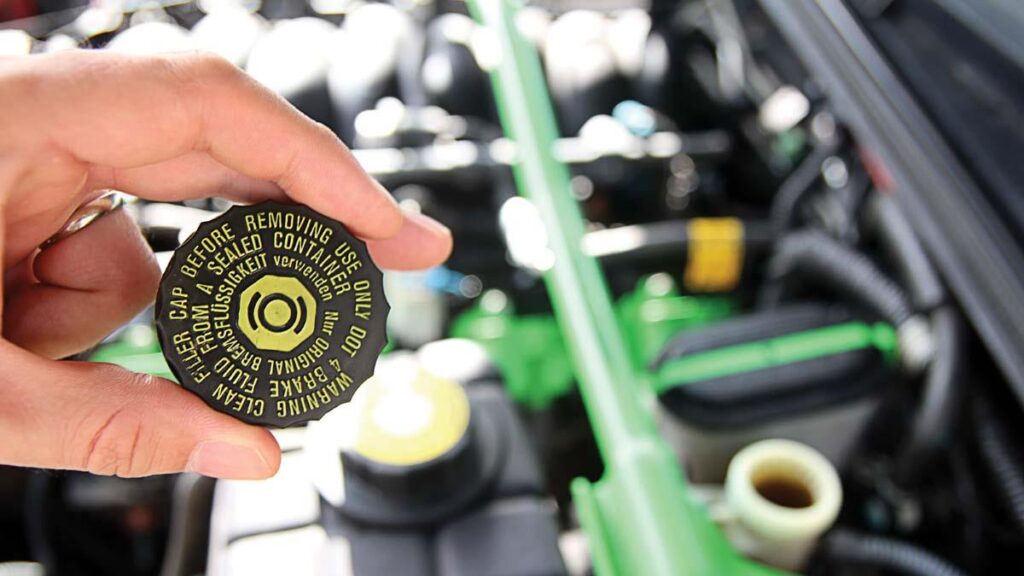
Brake fluid is an essential component of any vehicle’s braking system, but many drivers overlook its importance. The right type of brake fluid can significantly affect how well your vehicle performs and how safely it stops in an emergency. Brake fluid transfers force from the brake pedal to the braking components, making it critical for smooth and reliable operation. Understanding the different types of brake fluid and how they impact performance can help you maintain your vehicle and avoid costly repairs.
Brake fluid comes in several types, including DOT 3, DOT 4, and DOT 5, each with distinct properties. DOT 3 and DOT 4 are glycol-based and absorb moisture over time, which can lower their boiling points and reduce effectiveness. DOT 5, made from silicone, does not absorb water and is often used in specialty or classic cars. Choosing the wrong brake fluid or failing to replace it regularly can lead to brake failure, which increases the risk of accidents caused by brake failure and puts you and others on the road in danger.
How Moisture Affects Brake Fluid Performance
Brake fluid is highly susceptible to moisture contamination, which can drastically reduce its performance. Moisture enters the system through tiny cracks or openings and lowers the boiling point of the fluid. When the brake fluid heats up under heavy use, such as during downhill driving or stop-and-go traffic, moisture can cause the fluid to vaporize. This results in reduced braking power or, in extreme cases, total brake failure.
Regular brake fluid checks and replacements are essential for preventing these issues. Mechanics recommend flushing and replacing brake fluid every two to three years, depending on your driving conditions. Ignoring this maintenance can compromise your safety and increase wear on other components, leading to expensive repairs.
Understanding the Differences Between DOT 3, DOT 4, and DOT 5
DOT 3 brake fluid is the most common type used in passenger vehicles. It offers adequate performance for daily driving but has a relatively low boiling point, making it unsuitable for high-performance situations. DOT 4 fluid has a higher boiling point, making it a better choice for vehicles that experience heavy braking, such as trucks or sports cars. However, like DOT 3, it absorbs moisture over time, which can reduce its effectiveness if not replaced regularly.
DOT 5 brake fluid is different because it is silicone-based and does not absorb moisture. This makes it more stable over time, but it’s not compatible with most modern braking systems. It’s typically used in classic cars or vehicles that aren’t driven frequently. Choosing the correct brake fluid for your vehicle ensures optimal performance and reduces the risk of brake-related failures. Always check your vehicle’s manual to ensure you select the appropriate brake fluid for your specific system.
Signs Your Brake Fluid Needs Attention
Recognizing the early signs of brake fluid issues can help prevent costly repairs and maintain safe braking performance.
- Spongy or Soft Brake Pedal- A soft brake pedal often indicates air or moisture in the brake lines, reducing braking efficiency.
- Longer Stopping Distances- If your vehicle takes longer to stop than usual, it may be due to degraded brake fluid.
- Discolored or Dirty Fluid- Brake fluid should be clear or light amber. Dark or murky fluid signals contamination or age, which affects performance.
- Brake Warning Light- A warning light on your dashboard may indicate low brake fluid levels or a more serious issue in the braking system.
- Burning Smell After Braking- Overheated brake fluid can cause a burning odor, especially after hard braking, indicating that your fluid may need replacement.
Regular brake fluid inspections and maintenance help ensure your braking system stays in top condition, reducing the risk of accidents and costly repairs.
How Brake Fluid Impacts Vehicle Performance
The type and condition of your brake fluid directly impact your vehicle’s performance. Fresh, high-quality fluid ensures consistent braking power and improves response time. This is especially important in extreme conditions, such as towing heavy loads or driving on steep inclines. Poor-quality or old fluid can lead to brake fade, reduced control, and ultimately increase the likelihood of accidents.
High-performance vehicles, such as sports cars and heavy-duty trucks, often require upgraded brake fluid to handle the additional stress on the braking system. Regular maintenance helps ensure that your vehicle performs as expected, keeping you safe on the road. Upgrading to a higher-quality brake fluid can enhance braking efficiency and response time, especially in demanding driving conditions.
Preventing Brake Fluid-Related Failures
Preventing brake fluid-related failures starts with regular maintenance and attention to warning signs. Checking your brake fluid’s color, level, and condition can help you catch problems before they become serious. Avoid mixing different types of brake fluid, as this can reduce performance and damage your braking components. Regularly flushing and replacing brake fluid according to your vehicle’s maintenance schedule is also crucial for ensuring optimal braking performance.
It’s also essential to follow your vehicle manufacturer’s recommendations for brake fluid type and replacement intervals. Trusting a qualified mechanic for brake inspections and fluid replacements ensures your system remains in good condition. Staying proactive can save you from costly repairs and dangerous situations on the road.
What to Do After a Brake Failure Accident
Brake failure accidents are often sudden and terrifying, leaving victims with serious injuries and significant property damage. If you’re involved in an accident caused by brake failure, your first priority should be seeking medical attention. Document the scene by taking photos of the vehicles, skid marks, and road conditions. Collect contact information from witnesses and request a copy of the police report.
Contacting an attorney can help you determine if the accident was caused by a mechanical defect, improper maintenance, or manufacturer negligence. A legal professional can investigate the circumstances and work to secure compensation for medical expenses, lost wages, and other damages. Taking quick action is crucial for protecting your rights and ensuring you receive the compensation you deserve. Having legal representation can provide you with valuable guidance throughout the entire legal process.
Keep an eye for more latest news & updates on Buzz Feed!






